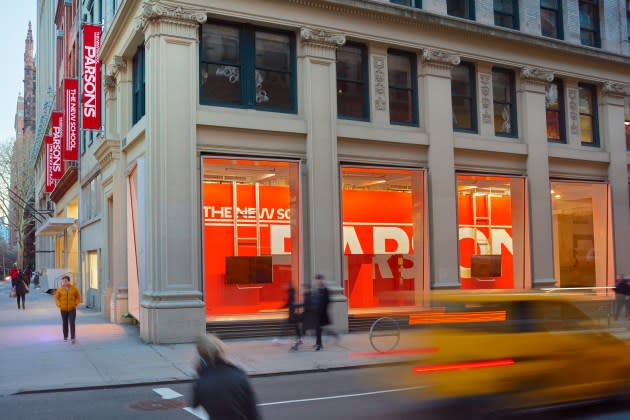The New School Names a New President, After a Few Rocky Months

After several tumultuous months due to a labor dispute with nonacademic workers and on-campus pro-Palestinian protests, The New School has tapped a new president — Joel Towers, who has a 20-year tie to the university.
As the university professor of architecture and sustainable design and the former executive dean of Parsons School of Design at The New School, Towers knows The New School well. He will become the 10th president of the university on Aug. 1, succeeding Donna Shalala, who has served as interim president since August 2023.
More from WWD
Double-Cs Unite for Francis Ford Coppola-Chanel Dinner at the Cannes Film Festival
EXCLUSIVE: Dior Names Rosalía Global Ambassador and Lady Dior Campaign Face
In June of 2023, Dwight McBride said that his decision to wrap up being the school’s ninth president was prompted by having been invited to become the Gerald Early distinguished professor and senior adviser to the chancellor at Washington University in St. Louis.
Towers will soon head up an institution with more than 10,000 undergraduate and graduate students and 126 degree programs. The New School’s colleges and graduate schools include Parsons School of Design, Eugene Lang College of Liberal Arts, the College of Performing Arts, The New School for Social Research, the Schools of Public Engagement, and Parsons Paris.
Towers is also the codirector of The Tishman Environment and Design Center at The New School, where his work focuses on sustainability, resilience and the development of policy and design-based solutions to climate change and the construction of healthy environments. While heading up Parsons School of Design for a decade, Parsons debuted new graduate and undergraduate programs, and built an integrated 26,000-square-foot cross-disciplinary Making Center facility.
Announcing Towers’ appointment, Linda Rappaport, chair of the board of trustees and co-chair of the presidential search committee, cited his “track record of success in sound financial stewardship and consensus-building, as well as a clear understanding of both the complexities and possibilities for our storied and unique academic institution.
“In this pivotal moment for The New School and for higher education more broadly, he inspires enthusiasm and critical thinking for what our university can do as we build on our mission and many achievements,” said Rappaport.
Earlier this month, one day after The New School’s Students for Justice in Palestine called for an emergency vote by the school’s board of trustees to divest from companies with ties to Israel, 43 protesters were taken into police custody at its downtown campus. The New School’s Students for Justice in Palestine led the protests.
After the police action was taken, the NYPD and Shalala said that the student protesters had been given the option to leave before the arrests were made. The majority who had been taken into police custody were later released without any charges. The New York Police Department had been called in by The New School to clear an encampment.
In a statement released after the student protesters’ arrests, Shalala said that some of the student protesters had blocked the entrance to Kerrey Hall, which houses 600 residents. By her account, after hours of negotiations with representatives of the student protesters, “they would not budge.” She also claimed that three offers for a meeting between some of the student protesters and representatives from the school’s investment committee were declined. She also claimed that student protesters had “escalated the situation and set up a second encampment.”
A week later a faculty-led encampment was set up on campus. Like TNS SJP, the faculty protesters are calling on The New School to divest from companies that had ties to Israel. Organizers spread the word about the new encampment, which they said is composed of autonomous faculty.
In March, academic student workers at The New School reached an agreement with the university for a successor contract following months of negotiations and a three-day strike.
The news of Towers’ leadership was released in advance of Tuesday night’s annual Parsons benefit. Designer Thom Browne, advocate and luxury brand consultant Bethann Hardison and the J.Crew Group’s chief executive officer Libby Wadle are the guests of honor at this year’s event at Cipriani Wall Street in New York. Just as Parsons specializes in interdisciplinary design and collaboration, this year’s honorees excel across different platforms. Each one is also being recognized for contributing to design, retail, fashion, philanthropy and social justice. As has been the case with other recent celebrations like the Met Gala and FIT’s annual awards gala, security was ramped up ahead of the benefit.
In advance of Tuesday night’s event, an email from nearly 60 TNS SJP supporters said the board of trustees has agreed to a vote by mid-June to consider divesting from funds with ties to Israel.
Asked for comment, a New School spokesperson referenced an online statement that had been shared with its community Monday. The statement said the call was based on resolutions by the Gaza Solidarity Encampments; the University Faculty Senate; University Student Senate; University Staff Senate; as well as the faculty councils of Eugene Lang College, The New School for Social Research, Schools of Public Engagement, Parsons School of Design, and the AAUP chapter. “They call for complete divestment from industries implicated in military and police violence in Gaza and the West Bank, and all global militarized conflict such as companies or subsidiaries involved in weapons manufacturing, military supplies and equipment, military communication, and public surveillance technology.” the statement read.
The supporters also said a picket was planned outside of the Parsons benefit as a reminder that clearing the student protesters’ encampment does not mean an end to TNS activism.
Editor’s note: This article was updated at 7:35 p.m. EST.
Best of WWD

